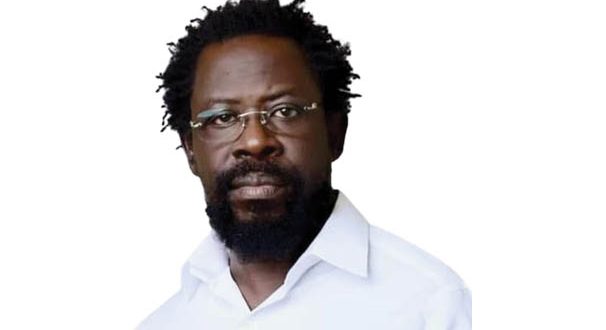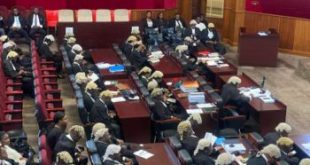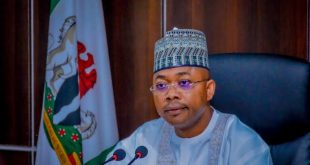In this interview, lawyer and social critic Dele Farotimi delves into the current state of the nation, addressing issues such as governance and the judiciary, among others on the Inside Sources program of Channels TV, by Laolu Akande.
You have practiced law for certainly more than two decades before you opted to be a private citizen doing something else. What are the major reforms that you think ought to take place in the judiciary?
Well, we as a people are quite fond of doing what Yorubas would call “Ama fi ete si le pa lapalapa.” We ignore the leprosy and embark on ringworm-curing exercises. It is not arguable that the Nigerian judiciary is in serious need, very urgent need, of a turnaround. But when you look at it almost as if it is only our judiciary and by curing that problem we would have resolved every one of our problems, it would be rather simplistic for anyone to make such pronouncements. But it is critical that the foundation of any state, which is the rule of law, must be strengthened by ensuring that proper fit and proper persons are the ones to be found in the judicial system. That would, of course, demand that the entire process of appointment and selection of judicial officers must be revisited. It cannot continue to be a place for perennial expressions of power and largesse. It cannot be a place where, because you are the CJ (Chief Justice), your sons and daughters, daughters-in-law, cousins, uncles, and even goats, qualified or not, all of a sudden become qualified for judicial appointment. It cannot be a place where you reward people who have been loyal to you, regardless of whether their loyalty is backed by patriotism to the country itself. It cannot just be a reward for the good old boys and girls who have served the system, which is what it has essentially been reduced to. And when you look at the end product, which should be the dispensation of justice, you see that there is little or no justice available to anyone within the country, not even the rich and mighty and powerful any longer, because what you now find are cacophonies of noises issuing faults from different courts, some type of coordinate jurisdiction saying different things. Look at the Kano situation, for instance. It says a lot about what has happened to us. When it is a poor man who is in need of urgent judicial relief, you won’t hear anything. Nobody is offering anything. He might be there for the next five years without his case ever seeing the light of day. But look at how many injunctions fly all over the place because they involve the high and mighty, the powerful and the rich, even when it’s their petty squabbles. So when we are talking about judicial reform, we must understand clearly that the judiciary is but one out of the many aspects of our country that has more or less collapsed. It is only reflective of everything else. It is reflective of our educational system. Everything about our country has come to the critical point where we must look at it honestly and stop lying to ourselves about the giant of Africa and all the many lies that we tell ourselves to cover the truth of the destruction of our country by those who have claimed to rule it. So yes, we need urgent judicial reforms, but it goes beyond just looking at the judiciary. It is easier to despair when we look at our case, but yes, the judiciary needs urgent reform. It is not just about the human resources; there are urgent needs for serious structural reform in the judiciary. There is a need to fund it properly. There is a need to be deliberate about dispensing justice and not just appearing to be paying lip service. How do you explain the way it is? Look at the number of people awaiting trial in our courts, and we claim to have a judicial system. Is it a disgrace?
I see two issues essentially when we are talking about judicial reforms: the rules and also the issue of ethics. In your own view, which is the more compelling problem of the judiciary?
You say to the crippled man with the load on his head, “Your load is lopsided,” and he responds, “You call it lopsided because you are focused on the load on my head without looking at the crookedness of my feet.” Let’s be clear about something. There are sufficient rules in our books that should have stopped the retired Chief Justice of Nigeria from appointing members of his family as judicial officers. The judicial code of conduct was sufficient, and you wouldn’t have ever heard of any such thing before Nigeria began its speedy descent into the abyss of impunity. So when you hear me saying that corruption is not our problem in Nigeria, it is impunity, I will link it to the issue of whether it’s about ethics or whether it’s about the paucity of laws. We have enough rules in our books that should prevent the egregious abuses that we see on a daily basis that have debased our judicial system and rendered it completely unfit for purpose. There are more than enough laws and rules. So this is not about the paucity of written guidance on what should be done or not done by persons within the system. It is about a complete disregard for the law. We don’t even pretend that the laws matter any longer. Corruption is when the system says something should be done in a particular order or form, and then somebody is giving undue pecuniary benefit, and they circumvent the system by speeding it up or doing something, maybe qualifying somebody who shouldn’t qualify. But when you see a situation where people simply walk to the answer without caring for the process, that is what has happened to us.
What do you mean?
The same way they do ‘wuruwuru’ to the answer in answering university exam questions, promoting people within the system, it is the same thing they are doing in the judiciary. So even in judicial pronouncements now, you see ever more ridiculous, obscene, and silly pronouncements issuing forth because there is simply no longer any regard for what should be common sense. Look, we have departed from the path of sense. That is why you have so many abominations flying up and down the place. It is about who has the power. Once they have the power, they don’t care about the consequences. This is no longer just about our case; it has moved beyond whether we are talking about ethics. Who is going to enforce the ethics? Who will enforce it in the absence of a societal decision to walk away from this ruinous path that we all appear to have embraced as a collective? You would imagine that if the judiciary went mad like ours appears to have gone crazy, then maybe the religious orders, whether Muslim or Christian, would have something to say about the complete absence of justice, manifest and complete absence of justice from our system. But which one of them have you heard saying anything? Who has said a word? So it’s not just about the judiciary; it’s just that it is easier to point at the judiciary because if you heard the rumbling of thunder, it’s easy for you to say rain is coming. So when what should be the last hope of the common man has become as hopeless as our own judiciary has obviously become, then it becomes alarming and we start talking about the judiciary. But which part of our lives as Nigerians really, in truth, encourages any hope? We all need to actually look at ourselves and tell ourselves the truth: what we have done to ourselves, our children is not sustainable. We have destroyed this country, and if we don’t call ourselves back, it will be beyond redemption very soon.
But you are a lawyer?
I am a lawyer; I was trained as one. I would even go as far as to sometimes argue that perhaps I was born one. But here is the thing: I have cases in the system. I went to court knowing I wouldn’t get justice, just for the record, just so that people will not say, “What did you do about it?” That’s how hopeless our judiciary has become. Only the rich can get any vestige of justice within the system. Only the rich and the powerful. The judicial system has become a tool for the oppression of the weak. People went out to protest against hunger. You had governments all over the place, even the ones in Lagos; they rushed all over the place, went to the court to get injunctions against people looking to protest. They used the judiciary to handcuff citizens who presumed to demand the right to peaceful protest. They used judges to issue pronouncements. To make the matter worse, the state went ahead and charged peaceful protesters with treason. You want to criminalize the right of protest? Hungry people came out; you are failing them daily, and you are criminalizing protest. And the judiciary has become complicit in the oppression and suppression of the Nigerian people. So if the people lose hope in the judiciary as they have, I have lost hope completely in the judiciary. That’s the honest-to-God truth. If the people lose hope in the judiciary, what is left?
We have seen instances of very troubling decisions, and I am sure that there are even deeper issues that most people don’t know about. But before we get too deep into it, we had on this show Chief Kano Agabi, a two-time Attorney General of the Federation, and he argued that whatever it is that we see happening in the judiciary is because the judges have been overworked. You must also think that there are still some good judges working in what you believe to be a bad system. How do you respond to that?
Every system is made up of people. So every system is only as strong or as weak as the people who make it up. If you have 100 judges and you can only point to perhaps five, 10, or 50 out of 100, and that has been overly generous, who can be said to be above board and capable of dispensing justice? And let’s be clear: corruption is not only about collecting money to pervert justice within the system. Corruption is making up your mind about the case before you even hear the matter because of your own prejudices. So when you have a situation where a fair amount, even if it’s 10 out of 100, are corrupt within a judicial system, that’s bad enough. But our judiciary is not any different from our police, customs, clergy, teachers, mechanics, or doctors, for that matter. They are us. So when we start talking about our judges, and yes, there are good ones among them, I have been at the mercy of this same judiciary that I speak about all the time.
You had a case in court?
I had a case where I was pursued through the court; I was convicted at the high court. It took the mercies of the Court of Appeal justices who reviewed the appeal to quash my conviction. So it is not as if I am speaking from a place where I am an angel and everyone else are devils or demons. No, it is about the system that we have built. Even when good judges are within the system, the administrative judges will not give them cases that involve people of power where they know the judge would not do their bidding. These are things that lawyers know. There was once a time in Lagos State when a particular person was in power as governor; when you sued Lagos State, that is the practice until today. If you sue a Lagos State agency or the state government, you will be collecting dates when the judges knew they would not even be sitting. So you might have a case in court for the next five years. Every time you went to court, you would get an adjournment because you are suing parties that may not be sued. That’s the kind of system we have evolved. The best that our judicial system can deliver the way it is currently is maybe the administration of impunity. So you just take care of those that must not be touched and, at best, give the semblance of justice to the victims of the system. But we’ve not evolved a judicial system that is truly capable of upholding the rule of law, dealing with everybody as equals, and truly being blind, as the goddess of justice is meant to be, holding a just scale and a sword that would do justice between the parties that are before it. Until our country is structured to deliver justice, until the judges themselves relate to the people to whom they are meant to be dispensing justice, until each and every one of us understands that the more we weaken the fabric of society by making all these exceptions for people that have rendered the system incapable of dispensing justice to all, our system is bound to grind to a halt one day, the way we are going.
Is it not time for the Nigerian elite, as part of how we can begin to reform our entire society, to have minimum standards of operation, one of which should be to enforce and ensure that we have the rule of law?
As you would have recalled from our past conversations, I am big on linguistic exactitude. So when you use the phrase “the Nigerian elite,” the question is, who is the Nigerian elite? Sybaritic, myopic, and people consumed by consumption. They don’t think beyond what they will eat next or what they will drink. That’s the only thing that ever crosses their minds. It’s just about existing. They don’t think beyond their lifetime. All they focus on is a stupid acquisition of money, an obscene display of debauchery of all sorts, an ever more debased acquisition of the commonwealth. Are those the ones you call elite? Mindless pursuit of money as if they are going to live forever. They live stupidly, consumed by the pursuit of money. We don’t have an elite in Nigeria. If we were a country blessed with an elite class, they would have demanded better, both of themselves and of the society they have built. You know the tragedy of the people you are calling elite. The pinnacle of their achievement in their own eyes is their capacity to buy homes abroad and send their children abroad. They are building things that their children cannot even inherit. They are not building a country that their children can survive in. Are those the ones you are calling elite? Which elite? Nigeria is not blessed with an elite class. Wherever you look at it, whether it’s in academia, politics, or the economy itself, which elite? The only thing they compete about is whose private jet is bigger. What is elite about our society? Exactly what have they done in society that suggests they may be considered elite? All of them are carrying second passports. Each and every one of the people you may call elite in Nigeria today has a second passport. If the British who govern us indirectly or the Americans who benefit from our putrefaction have not granted them either permanent residency or their passport, their children are carrying it, or they will go and buy one of the Mediterranean countries’ passports, or they will go to all these funny countries, Grenadines, including your traditional rulers; they carry these funny passports up and down. Are those the ones you are calling elite? Elites living in slums? We have no elites in Nigeria; let’s not fool ourselves.
There must be things that we should be able to talk about to rebuild?
I came into the public space in Nigeria in February 2015. From that time up until now, I have warned Nigerians each and every time they were getting to junctions and were about to make errors. I warned our rulers, and I warned the people themselves. Over the years, every critical moment, I have not found the peace of the grave. I kept my mouth open. I never kept quiet. And each time, I also offered solutions. I didn’t merely lament about the problems. I went further, and I wrote down the solutions. So I have never been quiet. I even participated in the last election; I got involved. So I have never been quiet, and I offered solutions. And this time again, I am not shy; it’s the same solution. That’s why I keep saying that we are lying to ourselves when we look at sectors. Our problem is systemic. We need to be honest enough to tell ourselves that our situation is abnormal, and we cannot find salvation within the existing system. The existing system is incapable of delivering anything positive. In the knowledge of that, I have said repeatedly over the years that we need a revolution in Nigeria.
Are you not concerned that such a revolution does not become violent?
The only duty of the conscious is to ensure that that revolution does not become violent. We are already in a tailspin. We are already entering multiple cycles of violence. The only reason the people appear to be docile is that nobody wants to go and fight without purpose. So those who believe that our system is unsustainable, as it is, and I believe that. I believe that what we should be doing is discussing the plan for the day after. Without a plan for the day after, what you have is chaos. Nkrumah was very specific. He said revolutions are brought about by men of action who act as men of thought. You don’t go onto the street and start burning. It’s common to be burning. But it’s within our right to tell our rulers that we can no longer accept the way we are being ruined. It is within our rights, even the democratic rights of citizens. Even though you might not treat us as citizens, even our human rights say that you cannot beat a child and then demand or dictate how loudly it must cry. The only thing that we have failed to do is to organize ourselves in a manner that forces the “ruiners” to understand that we are united in our demands. Maiduguri case? Look at what is happening in Maiduguri. They told you this dam was going to break. You knew. Less than a week before it eventually broke, you came out and said your team of experts said nothing would happen. They don’t care about us, and we can’t continue in this manner. What happened in Maiduguri is not unique to Maiduguri. You’ll find it replicated across the length and breadth of Nigeria. There is no part of our country that has escaped this madness. So why has it become so difficult for us? Because, like you said, you are looking for an elite. It is that elite class that should be building the consensus, that should be making the plan for the day after. But where are they? They are drinking 32-year-old whiskey. They are chasing their next big kill. Those are the ones who should now be telling the people that they should be having a plan for the day after the mess that we have become enmeshed in. So when you say solution, the solution is clear. We simply can’t continue like this. What you call a revolution is simply a turnaround. It is simple. The military can come with their banditry and then turn revolution into something that is supposedly violent because each and every military adventurist and bandit calls their people Revolutionary Army Council. Bandits calling themselves revolutionary. So they spoil the name. But what is a revolution? It simply means a turnaround, and you must at least know where you are coming from.
In spite of all the disorderliness that you have described, we still have to use some kind of orderly atmosphere to arrange what ought to be done because even you subscribe to the idea that you don’t want a bloody revolution.
There are different prophets sent to different pulpits. I don’t pretend to be Yele Sowore. I don’t pretend to be Peter Obi, Donald Duke, or anyone else. I am simply Dele Farotimi. It might very well be that the totality of the purpose of my own life is to point out to the members of that elite class who still retain some basic capacity to think like human beings, to listen to the ranting of the likes of me, who is not necessarily particularly sane. So they can then take that and understand that maybe all I need to do is rant like I am ranting so that the more reasonable and methodical people might begin to organize and start talking about the plan for the day after. There are good men in this country. What kind of stupid country would I be in if I am the only person who is capable of recognizing the truth? It would mean I am crazy. It is already bad enough that I am considered mad, but I know there are multiple people who also see the things I am saying and whose approaches are completely different from mine. But it doesn’t matter. Whatever approach they have, they are the ones who should now feel propelled to take action.
 National Telescope national telescope newspaper
National Telescope national telescope newspaper



